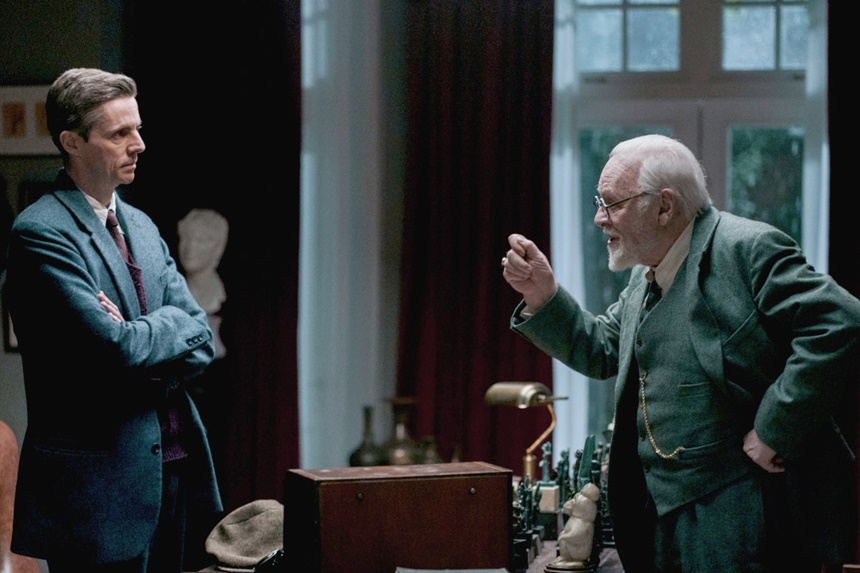Freud’s Last Session
⭐️ ⭐️ ⭐️
Runtime: 1 hour 48 minutes
Rating: PG-13
Stars: Anthony Hopkins, Matthew Goode, Liv Lisa Fries, Jodi Balfour
Writers: Matt Brown, Mark St. Germain
Director: Matt Brown
You’d have to be crazy to skip just about any performance by the inestimable Anthony Hopkins, and, despite a scattershot script, there are reasons aplenty to keep this appointment with his crusty, cantankerous take on Sigmund Freud.
“Religion’s eleventh commandment,” Freud wrote, “is ‘Thou shalt not question.’”
Freud may have been right about a lot of things, but that particular sentiment was proven wrong by C.S. Lewis, the Oxford instructor and Christian apologist who spent much of his career asking hard questions about faith and faithfulness in books like The Problem of Pain and The Screwtape Letters.
Freud’s Last Session imagines a 1939 encounter between Freud, among the 20th century’s most adamant atheists, and Lewis (Downton Abbey’s Matthew Goode), who was at the time just emerging as one of England’s leading Christian thinkers. Lewis’s Chronicles of Narnia books were still several years off, and not for another year or two would he become a familiar voice on BBC radio, but here director/cowriter Matt Brown (The Man Who Knew Infinity) has Freud nevertheless welcoming young Lewis — albeit grumpily — into his London study.
The two exchange pleasantries, but there is an unspoken agenda to the meetup: Lewis, whose satiric but earnestly faith-based book, The Pilgrim’s Regress, had lampooned Freud a few years earlier, seeks to make his case for Christianity to the Great Man — who, in turn, relishes the notion of flattening this pesky believer’s arguments with the twin hammers of science and reason.
I approached Freud’s Last Session anticipating a powerfully claustrophobic two-hander, with a pair of heavyweights hurling 12 rounds of intellectual roundhouses à la Spencer Tracy vs. Fredric March in Inherit the Wind, Laurence Olivier vs. Michael Caine in Sleuth, or Tommy Lee Jones vs. Samuel L. Jackson in The Sunset Limited.
In his Freud/Lewis face-off, however, it seems co-writer/director Brown doesn’t trust the power of either man’s arguments. Rather than go toe-to-toe, the two spend much of the film talking past each other, spouting plucky observations without bothering to dissect the comments that elicited them.
When Freud gets into Lewis’s face and demands that he defend a God who allows children to die in war, I want Lewis to push his face even closer and say something that will hit home with the guy. Instead, he leans back and utters some bromide about the Creator’s inscrutable ways — an argument that even a believer who understands the nuances of the point realizes will come off to anyone else as an empty platitude.
Likewise, when Lewis narrows his eyes and demands, “Why does religion make room for science, but science refuses to make room for religion?” the best Freud can come up with is a sarcastic, “Please, you’re breaking my heart.” It all resembles a modern-day Internet comment board where every scathing observation exists in a vacuum.
Perhaps in an effort to make the tete-a-tete more cinematic, Brown keeps interrupting the dialogue with flashbacks to the two men’s formative years, recounting the traumas that helped shape their disparate philosophies. Less helpfully, the film introduces an entire subplot involving Freud’s daughter, Anna (Liv Lisa Fries), herself a psychoanalyst of note and — to her father’s dismay — a lesbian in a not-very-secret relationship with a colleague (Jodi Balfour, who played Jackie Kennedy in The Crown).
Still, not even Freud’s conceptual shortcomings can diminish the fine performances at its center. Hopkins, congenitally incapable of letting an audience down, is positively splendid here. His Freud pursues Lewis with the cunning of an old cat, at times wheedling his opponent to catch him philosophically off-guard, then hissing his objections to what he sees as contradictions in humanity’s universal delusion.
As Lewis, Goode is called upon to assert the emotional restraint you’d expect of an Oxford scholar, a task that risks allowing the energized Hopkins to swallow him whole. But while this Lewis lacks bombast, he brings a measure of empathy and, through flashbacks of his traumatizing World War I experience, stoic vulnerability. Intellectual to a fault, his Lewis seems to be examining Freud as something of a specimen, fully aware he will not walk out of that house having initiated a paradigm shift in the old man (although he professes his desire to do so). One senses this Lewis, having glimpsed his emerging celebrity, is here largely to try out his powers of persuasion against the strongest imaginable opponent, just to see how far he can get.
“Doesn’t it hurt to smoke?” Lewis asks Freud when the psychotherapist, suffering mightily in the end stages of mouth cancer, takes a deep draw from his ever-present cigar.
“Yes!” he laughs with a startling guffaw, as if he understands he is a living example of his pioneering pain/pleasure principle.
Lewis is momentarily startled, but a glimmer of understanding emerges. I was hoping at this point to hear some version of what Lewis would someday write in The Problem of Pain: “God whispers to us in our pleasures, speaks in our conscience, but shouts in our pain: it is His megaphone to rouse a deaf world.”
But the words never come.
Perhaps it’s too much to ask for a script as smart as Freud and Lewis were, but at any given point along the way, Freud’s Last Session could have at least heeded the advice of Lewis himself: “You can’t go back and change the beginning, but you can start where you are and change the ending.”
Become a Saturday Evening Post member and enjoy unlimited access. Subscribe now




Comments
Thanks for this in-depth film review Bill, which itself drew me in from beginning to end. The subject of Freud’s last sessions, only shortly preceding him in death should be fascinating. You’re sooo right about Anthony Hopkins. One of the few bona fide stars we have today comparable to the Golden Age of film stars.